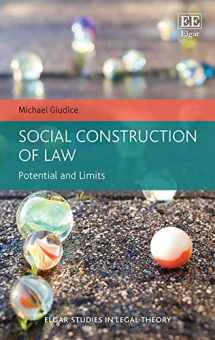
Social Construction of Law: Potential and Limits (Elgar Studies in Legal Theory)
Book details
Summary
Description
This illuminating book explores the theme of social constructionism in legal theory. It questions just how much freedom and power social groups really have to construct and reconstruct law. Michael Giudice takes a nuanced approach to analyse what is true and what is false in the view that law is socially constructed. He draws on accounts of European Union law as well as Indigenous legal orders in North America to demonstrate the contingency of particular concepts of law. Utilising evidence from a range of social and natural sciences, he also considers how law may have a naturally necessary core. The book concludes that while law would not exist without beliefs, intentions, and practices, it must always exist as a social rule, declaration, or directive; much, but not all, of law is socially constructed. This book will be a valuable resource for academics and students of law and philosophy as well as researchers interested in the intersections between analytical legal theory, socio-legal studies, and empirical legal studies.


We would LOVE it if you could help us and other readers by reviewing the book
Book review



